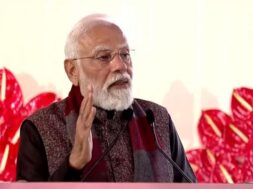
Manas Dasgupta
NEW DELHI, May 20: If the government’s latest Corona advisory is to be believed, the only protective measure against spread of the disease is to wear masks because social distancing and staying indoors, unless totally isolated from the entire outside world, have been tossed out of the windows.
The advisory issued by the office of the union government’s chief scientific advisor K VijayRaghavan said smaller aerosol particles can be carried in the air for 10 metres. In any urban centre in India, maintaining a distance of at least 10 metres between two persons would be impossible to achieve which would mean that in case of a third wave, the government can throw its hands up helplessly and blame the people for the spread of the infection by “not following the Corona-appropriate behavior.”
The new set of advisory issued on Thursday giving “easy to follow” guidelines on fighting Covid included wearing double masks, social distancing and well-ventilated spaces.
“Use of proper ventilation can prevent the spread of coronavirus,” the advisory said which also warned against running air conditioners while keeping windows and doors shut. “Running ACs traps infected air inside the room and increases risk of transmission from an infected carrier to others,” it said.
It recommended adding outdoor air in offices, homes and public spaces. Droplets and aerosols were the key transmission modes of the virus. While droplets fell up to 2 metres from an infected person, aerosols could travel up to 10 metres.
“Always Remember: People who show no symptoms can also spread the virus,” the document, titled “Stop the Transmission, Crush the Pandemic” said, urging people to rigorously follow Covid appropriate behaviour. While droplets fall within two meters from an infected person, smaller aerosol particles are carried in the air up to 10 metres, it said.
Saliva and nasal discharged in the form of droplets and aerosols by an infected person is the primary mode of virus transmissions, the document said, adding that an infected person without symptoms can also transmit the virus. “Just as smells can be diluted by ventilation, the dangerous concentration of the virus can be reduced by ensuring that outdoor air flows in,” it said.
Droplets emitted by an infected person land on various surfaces (where they can survive for a long time), the advisory said, calling for frequent cleaning of high contact points such as door handles, light switches, tables, chairs and the floor with disinfectants like bleach and phenyl.
People should wear a double layer mask or an N95 mask, which offers maximum protection, the new guidelines said. For double masking, wear a surgical mask, then wear another tight fitting cloth mask over it, the advisory said, adding that those who do not have a surgical mask can wear two cotton masks together.
“Ideally, surgical mask should be used only once, but when pairing, you can use it up to 5 times by leaving it in a dry place for 7 days after one use (ideally give it some sun exposure),” it said.
The document also highlighted the important role well-ventilated spaces play in diluting the risk of transmission from one infected person to the other.
“Just as smells can be diluted from the air through opening windows and doors and using exhaust systems, ventilating spaces with improved directional air flow decreases the accumulated viral land in the air, reducing the risk of transmission,” the document said.
Simple strategic placement of fans, open windows and doors, even slightly open windows can introduce outdoor air and improve the air quality inside, it added.
“In buildings with central air-management systems, improving central air filtration /increased filtration efficiency is especially helpful when enhanced outdoor air delivery options are limited. In offices, auditoriums, shopping malls etc. use of gable fan systems and roof ventilators are recommended. Frequent cleaning and replacement of filters is highly recommended,” the advisory noted.
Ventilation in hutments could be improved by adding “jaali or other simple air outlet”, apart from installing exhaust fans. “It is advised that jaali/air outlets with exhaust fans are installed by gram panchayats in homes where there is no cross-ventilation,” the advisory said.
For workplaces, it recommended keeping doors and windows open while air-conditioners were on. Hospitals should ensure that vaccinations were carried out in well-ventilated areas and public transport like buses should keep windows open and use exhaust fans.
People entering rural/semi-urban areas should undertake Rapid Antigen Test, the document said. “ASHA/Anganwadi/health workers must be trained and protected for conducting the Rapid Antigen Test. These health workers must be given a certified N95 mask even if they are vaccinated. ASHA/Anganwadi/Health Workers to also be provided oximeters to monitor infected person,” it said.
The support and cooperation of individuals, communities, local bodies and authorities was necessary to stop the transmission of the virus and decrease the infection rate to a level where it can eventually die, the guidelines said, adding, that “with the use of masks, ventilation, distancing, and sanitation, the battle against the virus can be won”.
















